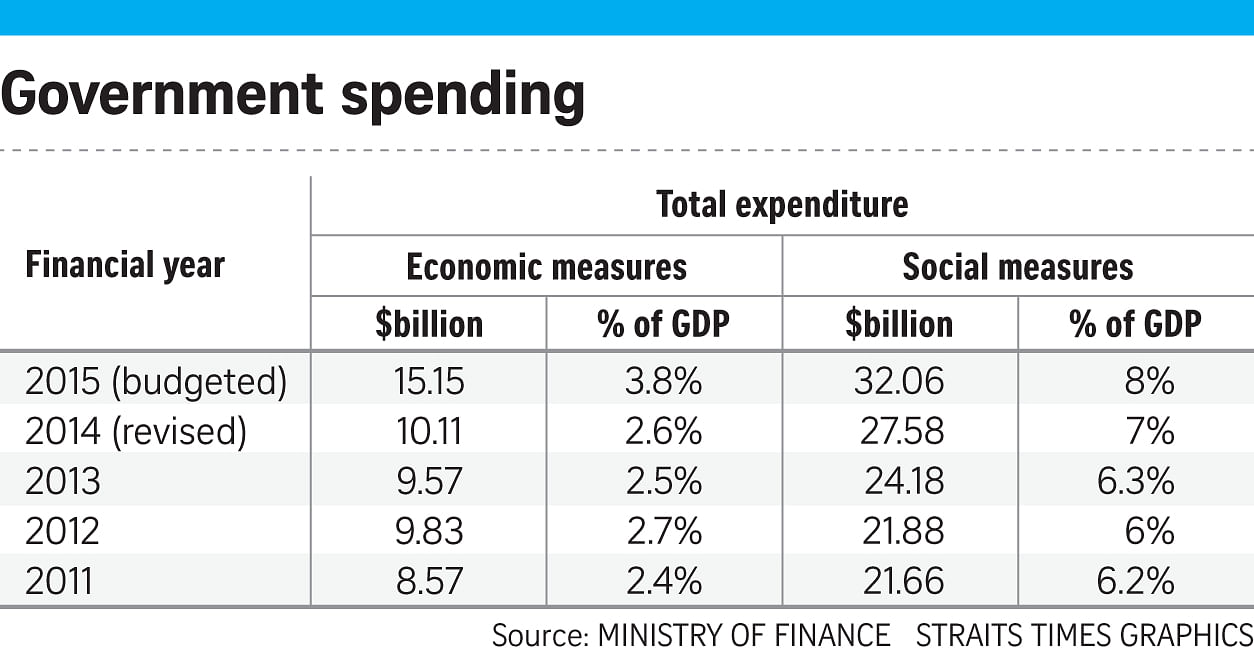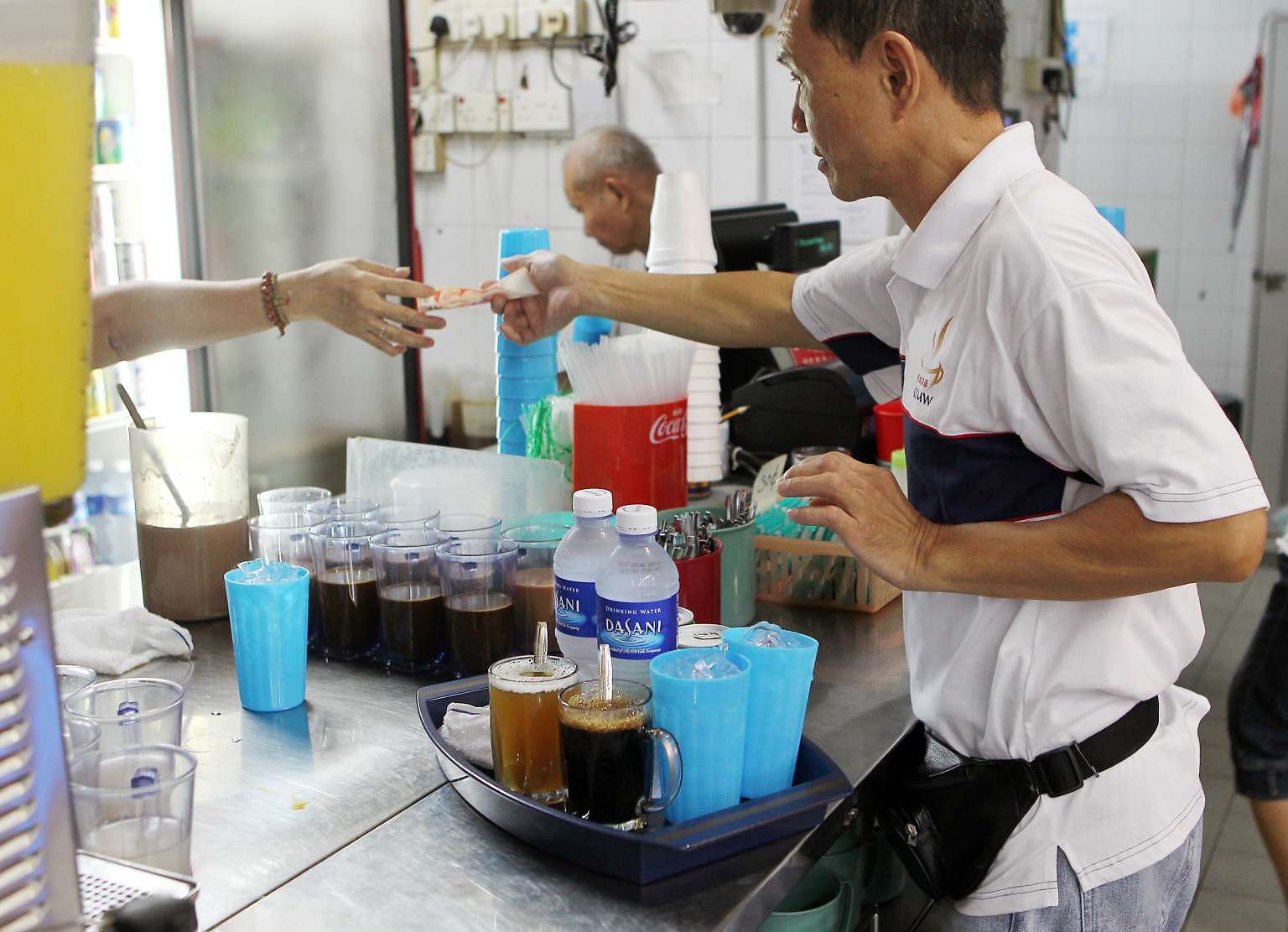A shot in the arm for SMEs?
New Budget. New Finance Minister. New government term. And a weaker economic climate, compared to February last year.
Last year, the economic outlook was already rather gloomy, but this year, things are looking even worse, with the economy struggling to fire. The Government expects it to grow by 1 to 3 per cent this year, while private economists last week cut their expectations to a 1.9 per cent expansion, down from 2.2 per cent.
And one of the things this means for Finance Minister Heng Swee Keat in presenting his first Budget on Thursday, six months after the People's Action Party won the General Election with a sweeping mandate, is that businesses will take centrestage.
This is unlike last time, when $32 billion was earmarked for healthcare and social welfare, which was more than double the $15 billion set aside for economic measures including seven Centres of Innovation to help small and medium-sized enterprises (SMEs) develop new projects.
Mr Heng has signalled less largesse, using the words, "particularly prudent". This is despite the fact that while last year's overall Budget expenditure put the national accounts in deficit, most of that red ink got mopped up by the end of the fiscal year. Also, accounts will be boosted by money from Temasek Holdings - the Government can now tap the Singapore investment firm's capital gains as revenue for the Budget, and not rely on just its dividends.
In terms of who will benefit this time around, Mr Heng said the Budget will address SMEs' immediate challenges, while supporting them as they navigate through Singapore's economic restructuring journey via innovation, internationalisation, transforming or upgrading their business models and making their operations more efficient.

For job-anxious workers, this is significant as SMEs - locally based, small-to-medium businesses with profits or revenue under $100 million - are a vital part of the economy. They employ 70 per cent of the workforce and contribute nearly half of the gross domestic product.
However, much has already been done over the past five years to encourage companies to innovate, look abroad and lift productivity. Schemes include the popular Productivity and Innovation Credit which offers a tax break or cash payout for certain investments, the Innovation and Capability Voucher and the Market Readiness Assistance Grant to help companies get started on venturing overseas.
Economists and political observers agree that this Thursday, it is unlikely there will be generous cash handouts or blockbuster packages for the business community. Measures will likely focus more on laying the groundwork for a long- term payoff.
They also point out that the Committee on the Future Economy, tasked to develop economic strategies for Singapore's future, will complete its work only at the year end. So it is unlikely that the Government will introduce any significant measures before their recommendations are released.
Still, many workers will be wondering: What might help their struggling bosses in the here and now?
NAVIGATING THE SLOWDOWN
One direct measure that might help comes from AITBiotech, an SME that has answered the Government's call for innovation but has yet to reap much benefit from that.
Over the years, the firm has invested heavily in research and development, creating the first made-in-Singapore toolkits to diagnose diseases such as dengue fever and H1N1.
These are cheaper than those made in Europe or the United States but of the same quality, says chief executive Alex Thian. However, many hospitals in Singapore still prefer to buy Western-made diagnostic kits, he says.
"I also provide a service to sequence the human genome. But in Singapore, I am competing against companies from China that are funded by their government and so can charge much lower prices. In the last five years, I've lost 95 per cent of the local government tenders I've participated in, to Chinese companies."
AITBiotech has also taken steps to venture overseas, with business in Thailand and Malaysia. But many countries, including China, Japan and South Korea, have rules that limit or forbid foreign biomedical companies from selling their products and services there, he notes.
What would really help would be if the Singapore Government's procurement policies prioritise supporting local SMEs, he says.
This would help companies grow their revenue, which in turn would allow them to invest even more in innovations and R&D, become big companies and be better able to attract and retain talent, he says.
Another SME that has done the right thing, but is struggling, is Yang Kee Logistics. Its chief executive Jos Raaymakers says his firm has been investing in innovation, technology and staff training and diversified its business over the years, but even so, is affected by the economic slowdown.
Orders have fallen sharply as clients in the oil and gas, manufacturing and retail sectors have been hard hit by slowing demand.
In the face of such challenges, the company would like help to upgrade its human resource strategies or invest in technology to better ride out the downturn, Mr Raaymakers adds.
Experts see Budget help for such firms coming in a niche manner. "One-off expenditures and handouts introduced in past Budgets could be removed and the funds could be channelled into targeted measures for SMEs, such as very surgical grants for certain capital expenditure or labour expenses," says Mizuho Bank senior economist Vishnu Varathan.
ANZ economist Ng Weiwen adds there is space to refine existing schemes, too.
"One mistake made in past Budgets is that the schemes introduced were too broad and not very targeted, so there was leeway to abuse the system," he notes. "It would be good if the Government closes these loopholes, or at least narrows them."
Both also expect Mr Heng to announce another deferment of foreign worker levy hikes.
For Mr Kurt Wee, president of the Association of Small and Medium Enterprises (ASME), the most important help that SMEs need right now is more support for internationalisation.
The Government could offer certain shared services to SMEs in their first 12 to 18 months in an overseas venture, he says. This would help them deal with administrative and bureaucratic issues, so they can focus on business operations.
"Why should 10 SMEs each hire their own general manager if they could share one? Why should they each have a secretary if they can share three?" he notes.
READYING BUSINESSES FOR THE FUTURE
Experts believe the Budget will also continue to have a long-term focus, furthering the Government's decade-long restructuring programme.
"It's time to look at the whole economic order and see how we want to operate in the next 50 years," says Mr Liang Eng Hwa, chairman of the Government Parliamentary Committee for Finance and Trade and Industry.
"What we used to do was to take in goods, add some value and earn something. But every other country in the region is doing that now, and more cheaply. The way to go is not just to add value, but to create goods of our own. So we won't be competing on cost but on ideas and innovation."
The public purse will not be extended to companies that are still clinging on to old modes of business, says Singapore Management University associate professor Eugene Tan.
"Given the lead-time given to companies to raise their game and embrace productivity and innovation, the mollycoddling of struggling companies will be reduced," he says.
Economist and Bishan-Toa Payoh GRC MP Saktiandi Supaat says it will be important for this and future Budgets to ensure that the cost of embarking on R&D and innovation does not become a deterrent.
"If we want to ride the next wave of economic growth, innovation needs to be more pervasive across all sectors. At the moment the only growth drivers for businesses in Singapore are domestic demand and government-related expenditures, which limits us until the external environment improves."
Mr Saktiandi also believes it would be more beneficial to have measures targeting specific industries: "For example, offering tax incentives to companies creating innovative solutions for an ageing society, or providing support to financial technology start-ups."
Mr Liang, meanwhile, expects that the sharing economy will be a big focus for the Government in the next few years.
The taxi sector, for example, has been shaken up by apps allowing people to use their own cars to take passengers for a fee, which optimises Singapore's scant resources, he says. "The Government should see this as an opportunity and do more to facilitate it."
However, helping businesses gear up for the future economy is only half the work - helping workers get ready is just as important.
Structural unemployment is set to worsen as Singapore continues to restructure its economy, and as technological advancements increasingly cause certain jobs and skillsets to become obsolete, Mr Liang warns.
As to what the Government could help SMEs do, he suggests introducing measures that would help companies plug the gap if they need certain high-tech skills in future but cannot find the right recruits.
"At the company level, we should help firms which are short of certain skills, by helping them if they need to offer customised training programmes or skills upgrading for their staff, or by offering scholarships."
Certainly it looks like the Budget will have a lot to tackle all at once - helping SMEs ride the slowdown and gear up for the future.
Mr Saktiandi said business leaders tuning in on Thursday should keep that in mind as they listen out for any goodies.
"I think there will be quite some effort made to put this Budget in the context of managing a slow-growth environment, but I also think it will be focused more on the medium-term and the future economy," he says.
"It will be about enhancing individuals, SMEs, multinationals and start-ups. Business owners will need to think about how to enhance their companies for the medium, rather than short term."
Philips expects stronger focus on fostering, harnessing innovations

The solution to operating in a slowing economy with increasing costs is for companies to step up innovations, says Philips' chief executive for Asean and Pacific, Mr Fabian Wong.
The world is a very different place from five years ago with innovations in technology rapidly changing the way things are done, he notes.
"We hope for a stronger focus on fostering and harnessing technological innovations to drive value creation in Singapore," says Mr Wong.
All he wants is for Govt to 'help smaller companies save jobs'

"I work for a very small company and we are dependent on larger businesses," he says, adding that "anything can go wrong any time".
"This is a constant fear I have, since the general consensus is that the economy is not doing well."
Extra push for growing businesses to overcome obstacles

Despite the slowing economy, the directors of Tea Ideas are not predicting a slowdown in sales this year. Still, director Albert Tan, 50, hopes to get an extra push from the Government to help overcome issues the company faces as it grows in scale and scope.
"We're an emerging SME that is past the stage of trying to prove ourselves," says Mr Tan, whose company makes a tea infuser called Tea Wands, which doubles as a strainer and a stirrer. Unlike tea bags, they do not collapse when steeped in water.
"It's breakthrough or breakdown for us. And I believe the needs of companies like us, at the three- to five-year mark of development, are similar."
Of coffee prices and hopes of a helping hand

Chua Chu Kang GRC MP Zaqy Mohamad tells The Sunday Times that the recent increase in drink prices at coffee shops is causing some unhappiness on the ground. It was reported that over 100 coffee shops in Singapore have increased the prices of coffee and tea, owing to rising rental and labour costs. A cup of kopi at some outlets now costs $1.30, up from $1 previously.
That is a 30 per cent increase - at a time when headline inflation is running at negative 0.6 per cent, in January.


